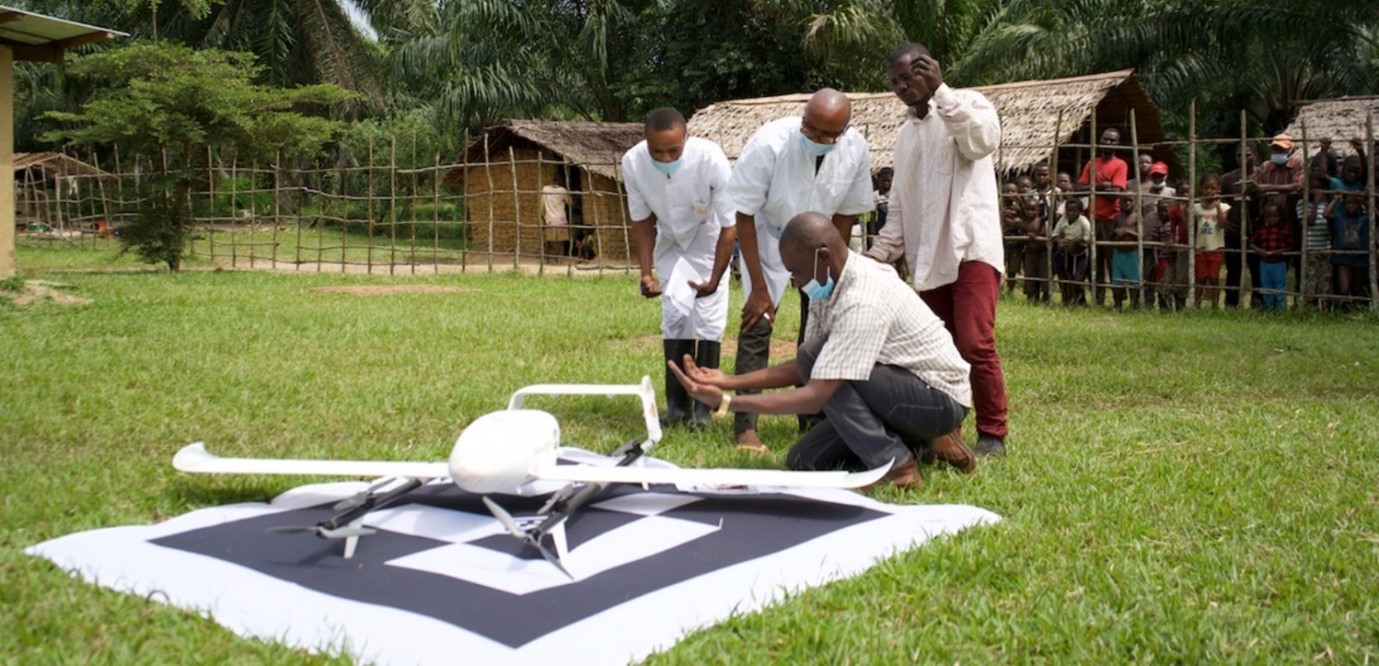Effective Delivery Of Vaccines In Africa Using Drone Technology

This is the 5th post in a blog series to be published in 2023 by the APET Secretariat on behalf of the AU High-Level Panel on Emerging Technologies (APET) and the Calestous Juma Executive Dialogues (CJED)
Africa is progressively embracing, adopting, and implementing the Fourth Industrial Revolution (4IR) to effect socio-economic development and transformation. As a result, this advancement is changing Africa’s economic outlook in agriculture, healthcare, and education, among other sectors. Particularly, innovation advancements such as artificial intelligence, blockchain, drone technology, robotics, biotechnology, and quantum computing, are among the technologies that are changing the economic outlook. On the other hand, the African Union's Agenda 2063 is encouraging its Member States to embrace and exploit these technologies for the economic development of the continent. These 4IR technologies are presenting an opportunity for African countries to develop their national development plans inclusively and equitably.
The usage of drone technology, also referred to as unmanned aerial vehicles (UAVs), is gaining attention and traction in Africa. Africans are employing UAVs for commercial and humanitarian purposes.[1] Besides being used as a complex military technology, drones are also utilised for industrial activities and entertainment tools to capture spectacular videos and footage of natural landscapes, sporting events, and urban landscapes. Furthermore, drones are being used to create better and more efficient processes such as surveillance to enable insurance companies to inspect damaged assets faster and more efficiently. In agriculture, drones are utilised to enable farmers to manage their farming activities more efficiently and collect essential crop data in real time. Furthermore, drones are effectively delivering and transporting commodities and other logistics from urban to remote areas. This is especially important in several African countries because of their feeble road and rail infrastructure.
For the past decade, Africa has been struggling with an outbreak of pandemics such as Ebola, Cholera and recently COVID-19. The deployment of vaccines in hard-to-reach areas and towns has been one of the issues impeding the continent's fight against these pandemics.[2] The Logistics Performance Index (LPI) Database of the World Bank has reported that the logistics for distribution and transportation in Africa have limited capacity and performance. Africa’s poor transportation and logistics are derailing the distribution of medicines and vaccines, making this rather dangerous, especially due to their short shelf-life spans.[3] Thus, African countries are challenged with addressing the logistical conundrum that can help address the timely delivery of vaccines. For example, a mass vaccination campaign's effectiveness depends on overcoming logistical obstacles and addressing vaccine reluctance. However, this becomes challenging if there are logistical challenges to transporting vaccines and medicines to the nearest vaccination centres.[4]
Drones’ technology is providing the logistical and delivery solutions that can potentially enable African countries to distribute essential supplies to disadvantaged communities, remove access restrictions, and facilitate the quicker delivery of life-saving medications and vaccines. African countries are progressively delivering medicines and vaccines using drones. For example, the Ghana government and Zipline deployed the COVID-19 vaccine to hard-to-reach areas within Ghana.[5] To facilitate the delivery, Ghana's Zipline branch has four distribution centres that are serving as a drone airport and a medical supply warehouse. Currently, these distribution centres are hosting a fleet of 30 fixed-wing drones. Operationally, drone aircraft are autonomously flying to their destination to drop off the vaccines and other medications via parachutes. The drones can deliver the vaccines as far as destinations that are 22,500 km away from the distribution centre. So far, the Zipline has distributed over 1 million vaccine doses in Ghana in over 50 thousand deliveries. Drone technology, therefore, enhances the supply chain for vaccines and circumvents the limited logistical and delivery infrastructure.[6]

Figure 1: Zipline air base in Omenako, Ghana
The Democratic Republic of Congo (DRC) has also adopted drones to deliver essential vaccines such as the yellow fever vaccine.[7] The DRC Ministry of Health, working on the Expanded Programme on Immunization (EPI)) undertook nearly a one-month vaccination campaign against yellow fever between October and November 2021. As such, the provincial government of Equateur province partnered with the Village Reach programme to deliver vaccines to hard-to-reach and remote villages using existing drone delivery networks. This was undertaken to meet the province’s goal of immunising approximately 90% of the population. Prior to the use of drones to deliver vaccines, the immunisation rate was at 78%. However, it has since increased to about 95% after the introduction of drones, thereby exceeding the intended targets. [8]

Figure 2: Yellow fever vaccination campaign in Equateur province, DRC
According to the African Union High-Level Panel on Emerging Technologies (APET) report, titled, “Drones on The Horizon: Transforming Africa’s Agriculture”, drone technology can enable African countries to flourish and leapfrog the coverage and impact of the technology on the continent within various development sub-sectors. Fundamentally, UAVs are altering the established transport system and enabling much quicker airborne delivery in cases where road transportation is problematic for the delivery of small packages in remote communities.[9] To this end, APET recommends that African countries should increase knowledge and experience sharing as well as capacity-strengthening efforts to upscale the harnessing of drone technology across the continent. APET observes that there is a plethora of possible advantages to utilising drones for delivery. This includes fostering rapid transportation, providing more efficient supply chains, and enabling the delivery of emergency medical supplies. This, the Panel opines, will support infrastructure, regulatory strengthening, research and development, and stakeholder engagements.
In conclusion, APET asserts that drone technology can enable a more targeted and efficient delivery, which can enhance anticipatory action, rapid life-saving work, and monitoring capacities to inform immediate and future responses. Drone technology is also strengthening impact assessment and the communication of vital information. It is, however, important that African countries invest in drone development and deployment. Furthermore, to support commercialisation, African countries should update relevant policy frameworks in order to create an enabling environment for drone technology development and adoption. Such efforts will positively impact the support and delivery of healthcare services such as medicines and immunisation programmes.
Featured Bloggers – APET Secretariat
Justina Dugbazah
Barbara Glover
Bhekani Mbuli
Chifundo Kungade
Nhlawulo Shikwambane
[1] https://clustercollaboration.eu/community-news/drone-industry-africa#:~:text=Nowadays%2C%20drones%20are%20being%20used,of%20supplies%20in%20rural%20areas.
[2] https://institute.global/advisory/solve-delivery-challenges-today-futureproof-africas-vaccine-infrastructure.
[3] https://www.imf.org/en/Publications/fandd/issues/2021/12/Last-Mile-Improving-Sub-Saharan-Africa-Vaccine-Access-Bempong-Munemo
[4] https://www.imf.org/en/Publications/fandd/issues/2021/12/Last-Mile-Improving-Sub-Saharan-Africa-Vaccine-Access-Bempong-Munemo.
[5] https://www.theverge.com/2021/3/9/22320965/drone-delivery-vaccine-ghana-zipline-cold-chain-storage.
[6] https://www.umsl.edu/business/departments/supply-chain/research/vaccine-drone-delivery.html.
[7] https://www.logupdateafrica.com/cargo-drone/drones-save-the-day-in-yellow-fever-vaccine-campaign-in-drc-1338122.
[8] https://www.logupdateafrica.com/cargo-drone/drones-save-the-day-in-yellow-fever-vaccine-campaign-in-drc-1338122.
[9] https://www.nepad.org/publication/drones-horizon-transforming-africas-agriculture.


